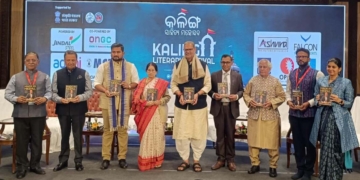Researchers at the National Institute of Technology (NIT) Rourkela have unveiled a reusable photocatalyst system designed to clean industrial wastewater using natural sunlight.
Built on spherical concrete beads, this sustainable innovation presents a low-cost and environmentally friendly alternative for addressing water pollution caused by industrial discharge.
The research, led by Prof. Subhankar Paul from the Department of Biotechnology and Medical Engineering, along with Dr. Sohel Das and Mr. Uma Sankar Mondal, has been published in the prestigious Journal of Water Processing Engineering. The team has also filed two patents for their novel technology.
The newly developed system integrates iron-doped nano-titania (Fe-nTiO₂) and graphene oxide, immobilised onto green concrete beads made from coal fly ash-derived zeolite. This unique approach enhances the beads’ mechanical strength, porosity, and absorption capacity, allowing efficient degradation of toxic pollutants under sunlight.
Promising Results & Large-Scale Applications When tested on simulated wastewater with a high Chemical Oxygen Demand (COD), the photocatalyst system achieved an 82% reduction in COD under sunlight. Remarkably, it retained over 90% efficiency after 15 cycles of reuse, making it highly viable for large-scale wastewater treatment.
“The developed technology provides an affordable and sustainable solution for treating industrial and municipal wastewater without relying on external energy sources,” said Prof. Paul. “Its reusability and effectiveness make it a game-changer for resource-constrained areas.”
This innovation marks a significant step forward in combating global water pollution, offering a timely and scalable solution for industrial and environmental sustainability.
















 >> Ready for Raja Saab chills? 😍""Ravishing Malvika x Epic Prabhas = January blockbuster! 🌟""Beach slay to Raja throne. Malvika's month is lit! 🔥#MalvikaMohanan
#RajaSaab
#TheRajaSaab
#Prabhas' data-src='https://scontent-bom5-1.cdninstagram.com/v/t51.71878-15/607277750_25235957859410048_4986893047092392714_n.jpg?stp=dst-jpg_e35_tt6&_nc_cat=109&ccb=7-5&_nc_sid=18de74&efg=eyJlZmdfdGFnIjoiQ0xJUFMuYmVzdF9pbWFnZV91cmxnZW4uQzMifQ%3D%3D&_nc_ohc=4P4NgveXrCQQ7kNvwFXYUr_&_nc_oc=AdmB4frSH8UoDUxLFx2jeFEPMR0XBvtBMzFIbVDSbZCG8i4E-XwNnviIUm2Dy70vs-fcuWh-OOS8aA-3k58j6eZ1&_nc_zt=23&_nc_ht=scontent-bom5-1.cdninstagram.com&edm=ANo9K5cEAAAA&_nc_gid=KbBsh3HdPQxxhVFJpXvS2Q&oh=00_Afr58NJbqdAzeaZ7duC7AKD3K3KhXPWXumxyvXkCf0pxMw&oe=696529E2' title='"Waves crashing, Malvika slaying. Ravishing looks from her rocky shoot, countdown on for Prabhas-Malvika madness in Raja Saab! 🎥⚡"Reel Hooks"Malvika's rocky beach glow >>> Ready for Raja Saab chills? 😍""Ravishing Malvika x Epic Prabhas = January blockbuster! 🌟""Beach slay to Raja throne. Malvika's month is lit! 🔥#MalvikaMohanan
#RajaSaab
#TheRajaSaab
#Prabhas'>
>> Ready for Raja Saab chills? 😍""Ravishing Malvika x Epic Prabhas = January blockbuster! 🌟""Beach slay to Raja throne. Malvika's month is lit! 🔥#MalvikaMohanan
#RajaSaab
#TheRajaSaab
#Prabhas' data-src='https://scontent-bom5-1.cdninstagram.com/v/t51.71878-15/607277750_25235957859410048_4986893047092392714_n.jpg?stp=dst-jpg_e35_tt6&_nc_cat=109&ccb=7-5&_nc_sid=18de74&efg=eyJlZmdfdGFnIjoiQ0xJUFMuYmVzdF9pbWFnZV91cmxnZW4uQzMifQ%3D%3D&_nc_ohc=4P4NgveXrCQQ7kNvwFXYUr_&_nc_oc=AdmB4frSH8UoDUxLFx2jeFEPMR0XBvtBMzFIbVDSbZCG8i4E-XwNnviIUm2Dy70vs-fcuWh-OOS8aA-3k58j6eZ1&_nc_zt=23&_nc_ht=scontent-bom5-1.cdninstagram.com&edm=ANo9K5cEAAAA&_nc_gid=KbBsh3HdPQxxhVFJpXvS2Q&oh=00_Afr58NJbqdAzeaZ7duC7AKD3K3KhXPWXumxyvXkCf0pxMw&oe=696529E2' title='"Waves crashing, Malvika slaying. Ravishing looks from her rocky shoot, countdown on for Prabhas-Malvika madness in Raja Saab! 🎥⚡"Reel Hooks"Malvika's rocky beach glow >>> Ready for Raja Saab chills? 😍""Ravishing Malvika x Epic Prabhas = January blockbuster! 🌟""Beach slay to Raja throne. Malvika's month is lit! 🔥#MalvikaMohanan
#RajaSaab
#TheRajaSaab
#Prabhas'>











